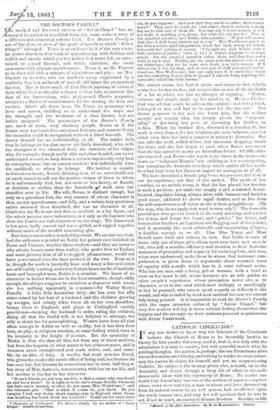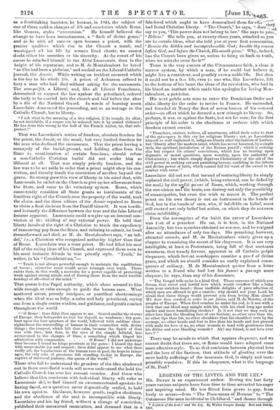CATHOLIC LIBERALISM.* IF any one wishes to know why the
Liberals of the Continent.
believe the Church of Rome to be incurably hostile to liberty let him ponder this essay, read it, that is, not only with the admiration it is sure to receive, but with acareful search after its guiding thoughts. Its author, is, perhaps, the one Frenchman alive whois devoted to civil liberty, and willing to render to every adver- sary the justice he claims for himself, and yet an unquestioning Catholic. Its subject is the strange priest who, a monk, sat in the Assembly, and strove through a long life of effort to reconcile democratic ideas with the supremacy of Rome. No reader can doubt that Lacordaire was one of the noblest of natures.—a priest whose vows were realities, a man in whose soul love, dammed up from its natural course by an evil system, had overflowed upon the whole human race, and very few will question that he was in act, if not in heart, an enemy to human freedom. Starting in life
• Yemoir of the Abbe Lacordaire. By M. de Montalembert. Bentley.
as a freethinking barrister, he became, in 1821, the subject of one of those sudden changes of life and conviction which Rome, like Geneva, styles "conversion." He himself believed the change to have been instantaneous, a " flash of divine grace," and as he with all careers open became a priest, with the precise qualities which rise in the Church a monk, and worshipped all his life by women lived chaste, we cannot doubt either his assertion or his sincerity. At the outset of his career he attached himself to the Abbe Lamennais, then in the height of his reputation, and to M. de Montalembert lie loved if lie had been a plebeian," and worked on the Liberal-Catholic journal, the Avenir. While writing an incident occurred which is the key to his whole life. A priest of Aubusson refused to bury a man who bad died without asking for the sacraments. The sous-pre:fit, a Liberal, and, like all Liberal Frenchmen, determined to support the law against the priesthood, ordered the body to be carried into the church and laid before the altar by a file of the National Guard. In words of burning scorn Lacordaire denounced the proceeding, not as an outrage to the Catholic Church, but to liberty.
"I ask what is the meaning of a free religion, if its temple, its altar, be not inviolable, if a corpse can be ushered into it by armed violence ? He has done this wrong to the half of the French nation, he, that sub- prefect !"
That was Lacordaire's notion of freedom, absolute freedom for the priest, the Jesuit, or the monk, but very limited freedom for the man who declined the sacraments. That the priest having a monopoly of the burial-ground, and holding office from the State in consideration of certain functions, should refuse a non-Catholic Christian burial did not strike him as illiberal at all. That was simply priestly freedom, and the law was to be set aside in order that a priest might obey his con- viction, and thereby insult the conviction of another beyond the grave. So strong grew this view of liberty in his mind that, with Lamennais, lie called on the Church to give up her allowances from the State, and recur to the voluntary system. Rome, which consistently considers all State grants as instalments of the limitless right of the Church over the property of the world, took the alarm, and the three editors of the Avenir repaired to Rome to claim a final decision from the Pontiff himself. It was hostile, and instantly the difference between the true and the false Liberal became apparent. Lamennais could not give up an internal con- viction at the bidding of any external power. He held that liberty involved the right of a Christian to teach the expediency of renouncing pay from the State, and refusing to submit, he lived thenceforward and died, as M. de Montalembert says, " an infi- del," i.e., a Christian who recognized authority higher than that of Rome. Lacordaire was a truer priest. He had filled his soul full of the ruling ideas of his Church, and expressed them even to his most intimate friends in true priestly style. " Truth," he writes, in his " Considerations,"— "'Truth is not always powerful enough to maintain the equilibrium of forces ; otherwise error would never triumph over truth. There exists then, in this world, a necessity for a power capable of protecting weak against strong minds, and of freeing them from the most terrible bondage of all—that of the mind.' " Tbat power is the Papal authority, which -alone seemed to him wide enough or calm enough to guide the human race. What mattered errors, priestly intrigues, or pontifical shortcomings when the ideal was so lofty, a calm and holy priesthood, raying
out from a single centre wisdom, and guidance, and gentle comfort throughout the world.
" 0 Rome : thus didst thou appear to me. Seated amidst the storms of Europe, thou betrayedst no fear for thyself, no weakness ; thy gaze, bent upon the four quarters of the world, followed with sublime clear- sightedness the unravelling of human in their connection with divine things ; the tempest, which left thee calm, because the Spirit of God -was with thee, lent thee, in the eyes of the simple faithful, less accustomed to the changes of time, a something which tinged his admiration with compassion 0 Rome ! I did not underrate thee because I found no kings prostrate at thy gates : I kissed thy dust with unspeakable joy and respect : thou didst appear to me what thou -really art, the benefactress of the human race in past, its hope in future ages, the only relic of greatness left standing to-day in Europe, the captive of universal jealousy, the queen of the world.' "
Those who fail to understand the grandeur of the idea shadowed out in those over-florid words will never understand the hold the Catholic Church has over her earnest votaries. And those who believe that idea consistent with individual liberty will wake as Lamennais did, to find himself en excommunicated apostate for having dared, on a question never dogmatically settled, to hold his own opinion. Guidance, however gentle, implies obedience, and the obedience of the soul is incompatible with liberty. Lacordaire and his lay friend, without a change of conviction, published their unreserved recantation, and dreamed that in a
falsehood which ought to have demoralized them for es■I.,1 v. had found Christian liberty. " The Church," he says, does4;., sot say to you, 'This power does not belong to her.' She says to you,s„
Believe.' She tells you, at twenty-three years, attached as you are to certain ideas, what she told you at your first communion, ' Receive the hidden and incomprehensible God; humble thy reason before God, and before the Church, His mouthpiece.' Why, indeed, has the Church been given us, unless to bring us back to truth, when we mistake error for it?"
There is the very essence of the Ultramontane faith, a clear it narrow system, by which a man, if lie could but believe it, might live a consistent, and possibly even a noble life. But then it could not be a free life, even to one who, like Lacordaire, felt to the bottom of his heart the ideas of the revolution, who had in his blood an instinct which made him apologize for loving Mon- talembert, a patrician.
His next public acts were to enter the Dominican Order and claim liberty for the order t6 revive in France. He succeeded, and founded at Nancy the first of seven houses of his restored order—an effort which lie deemed a new triumph to liberty. So, perhaps, it was, as against the State, but not for man; for the first principle of his order is the obedience ut cadaver with which freedom cannot coexist.
"Preachers, orators, writers, all unanimous, added their voice to that of the episcopacy in this cry for religious liberty ; not, as Lacordaire himself so well explained it, religious liberty after the fashion of Luther, but 'liberty after the modern mind, which has never lessened, by a single inch, the spiritual jurisdiction of the Roman pontiff ; which is nothing else but respect for others' convictions, which has no bearing upon dogmatic or moral questions, upon worship, upon the authority of Christianity ; but which simply deprives Christianity of the aid of the civil power in seeking out and punishing heresy, confiding in the inborn and divine power of faith, which cannot fail for -want of the sword in its combat with error.'"
Lacordaire did not see that instead of restoring liberty he simply replaced the civil power, (which, being external, can be defied by the soul,) by the aiful power of Rome, which, working through
the conscience and the brain, can destroy not only the possibility
of emancipation, but even the wish to secure it. The perfect priest on his own theory is not an instrument in the hands of God, but in the hands of men, who, if infallible on belief, must still control not only belief but action, on which they do not even claim infallibility.
From the assumption of the habit the career of Lacordaire was that of a preacher. He sat, it is true, in the National Assembly, but two speeches obtained no success, and he resigned after an attendance of only ten days. His preaching, however, attracted crowds, and M. de Montalembert wisely gives up a chapter to examining the secret of his eloquence. It is not very intelligible, at least to Protestants, being full of that unctuous sweetness, that treacly fervour, apparent in all Catholic pulpit eloquence, which fervent worshippers consider a proof of divine grace, and which we should consider an easily explained conse- quence of celibacy. M. de Montalembert quotes from a letter written to a friend who had lost his fiancee a passage more eloquent, he says, than any of his discourses.
"'The Gospel tells us ho is a kind God. Those caresses of which you dream, that sweet and lawful love which would overflow like a balm from your stricken heart ; those ineffable delights of pure affection of which men are allowed to get a snatch; why should not your Lord be afraid that these things would prevent you from loving Him alone ? We have been crushed, in order to our fusion, said M. de Maistre, of the peoples of Europe. When God crushes us under the rod, is it not with a view that our blood may mingle with his, with his shed long ago under harder and more humiliating strokes ? Is it not that we may seek no other face than the bleeding face of our Saviour, no other eyes than his, no other lips than his, no other shoulders than his shoulders torn by the scourge, no other bands and feet to kiss than his hands and feet pierced with nails for love of us, no other wounds to tend with gentleness than his divine and ever bleeding wounds ? Ah ! my friend, is not love ever love ?' "
There may be minds to which that appears eloquence, and we cannot doubt that there are, or Rome would have adopted some more effective style. To us that confusion between physical love and the love of the Saviour, that attitude of gloating over the mere bodily sufferings of the incarnate God, is simply and inex- pressibly repulsive. If this be eloquence, what is the language of St. Paul?































 Previous page
Previous page